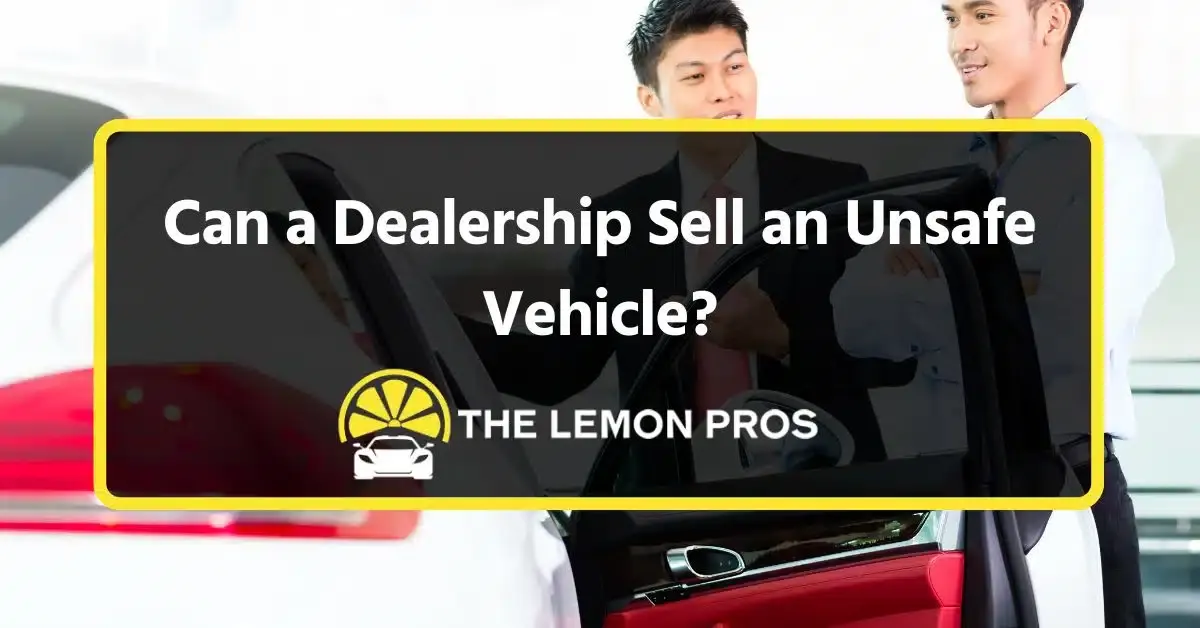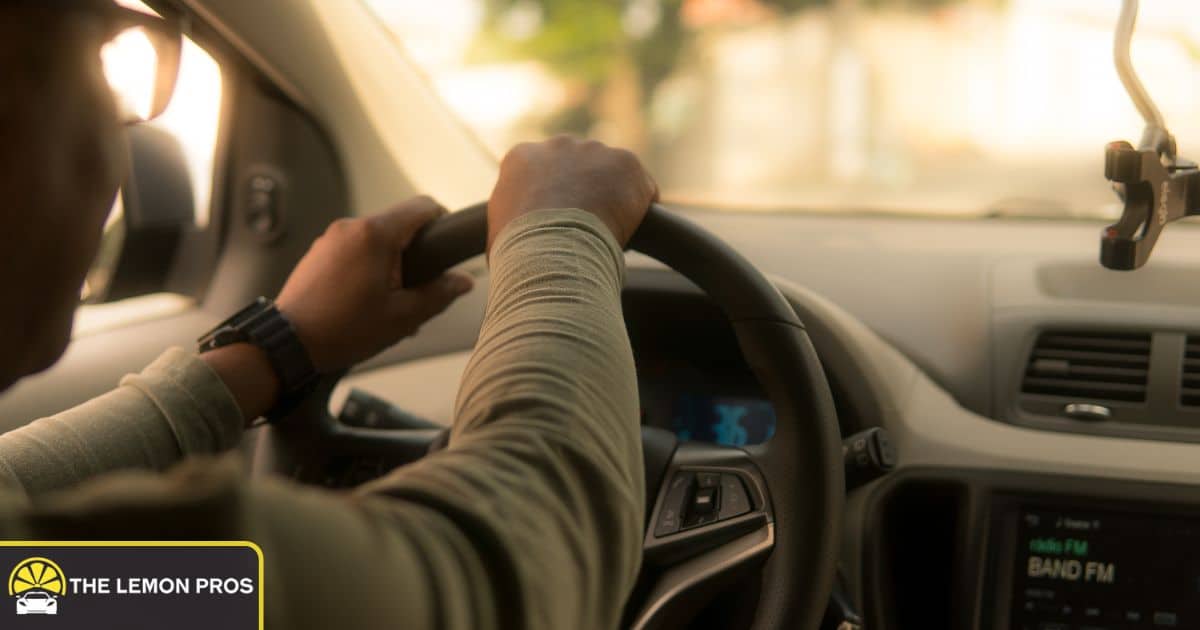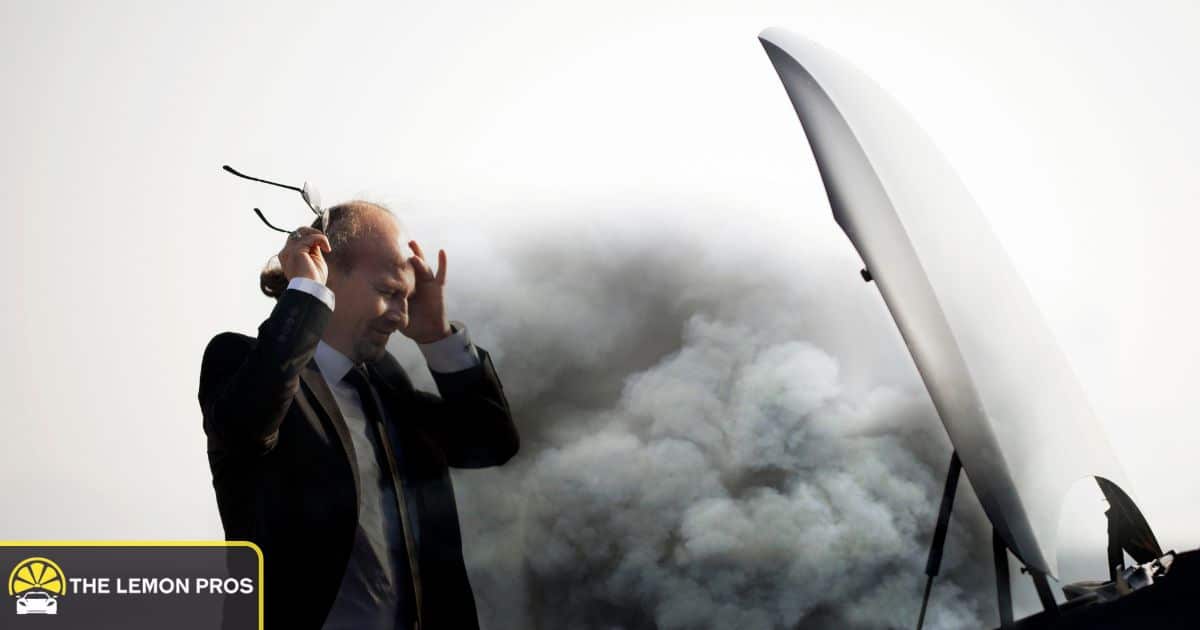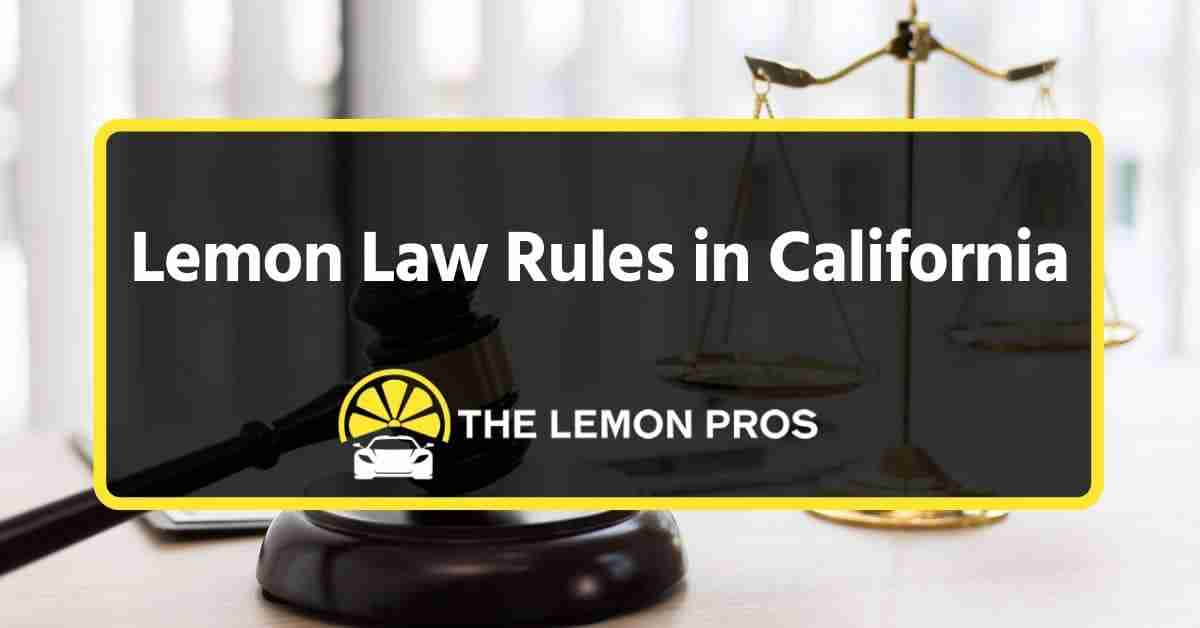
Can a Dealership Sell an Unsafe Vehicle?
When you buy a vehicle from a car dealer, you expect it to be durable and reliable. Yet, some people find that they are only left with an unsafe car that they are scared to drive. In this situation, it’s crucial to know your rights as a buyer so you don’t get stuck driving a bad vehicle.
Car dealers are held to a higher standard than private sellers, meaning you should be able to trust the purchase. If a dealership knowingly sold you a defective vehicle, you have legal options to get out of the car. With Lemon Law, you can get out of the unsafe vehicle through a buyback or replacement.
The Lemon Pros has the experience to help you as a car buyer if you need to seek legal advice. Whether you are dealing with auto fraud or a lemon vehicle, our focus on this specific practice area makes us the experts in the field. Contact us today for your free initial consultation.
Let’s take a closer look at what makes a car unsafe and whether or not a dealership can sell a vehicle that’s dangerous to drive. We also show you what to do next if the dealership sells you a bad car or commits auto fraud.
Table Of Contents
- What Makes a Vehicle Unsafe?
- Can a Dealership Sell an Unsafe Vehicle?
- What to Do if a Dealership Sold You an Unsafe Vehicle
- Can You Sue Car Dealers for Selling an Unsafe Vehicle?
- Not Sure What to Do with an Unsafe Car? Talk to an Attorney
- FAQ
- What Can I Do if a Dealership Sold Me a Bad Used Car?
- Can I Sue a Dealership for Selling Me a Bad Car?
- What Kind of Lawyer Do I Need to Sue a Car Dealership?
- Can a Car Dealer Be Held Liable if They Fail to Disclose Known Issues?
- What Are Car Lemon Laws and How Do They Protect Buyers?
- How Do Consumer Protection Laws Apply to Used Car Purchases?
- When Should I Contact a Fraud Attorney After Buying a Car?
- What Should I Do if a Car I Bought Has an Open Safety Recall?
- What Happens if the Dealer Knew About a Defect but Sold the Car Anyway?
- How Can I Verify a Vehicle’s History Before Purchase?
What Makes a Vehicle Unsafe?

An unsafe vehicle differs from a defective vehicle because the flaw poses a risk that puts lives in danger. For example, a faulty vehicle may have an electrical system issue that creates trouble with the power windows, while a safety issue is more related to the airbags, brakes or high-tech driver-assist systems. If the equipment doesn’t meet federal standards (such as those set by the state DMV and NHTSA), it is likely unsafe. It may also be a lemon since the criteria require that the vehicle have irreparable defects affecting its use, value, or safety.
Today’s automotive safety systems go beyond just the brakes, airbags, seat belts and tires. Various warning lights and systems now exist in cars to protect consumers from accidents. New vehicles come equipped with a range of features, including blind-spot monitoring, lane departure warning and adaptive cruise control. Any failure in these systems can lead to potential safety issues.
According to the National Safety Council, ADAS technologies may prevent or mitigate nearly 1.7 million injuries, accounting for approximately 60% of all injuries that occur. The majority of this reduction comes from using lane-keeping assist and forward collision prevention technologies, provided these systems are operating as intended.
How to Identify an Unsafe Vehicle Before Buying
When purchasing a new or used car, there are several ways to determine its safety. First, check for an open car recall that could impact its safety. The NHTSA makes it easy to search for recalls with the VIN.
You also want to have the vehicle inspected for any signs of damage or safety issues. Look carefully for indications of frame damage, flooding, or odometer rollbacks. Having a professional pre-purchase inspection may cost you some money, but it will be a small price to pay compared to the repair costs you would incur if you miss a major defect.
Above all, if you have a gut feeling that something is wrong or you notice something alarming, trust your instincts. It’s better to continue car shopping than to end up with a vehicle that puts you and your passengers in danger.
Can a Dealership Sell an Unsafe Vehicle?

In most states, the dealer is responsible for selling safe vehicles. Car dealers cannot knowingly sell a vehicle with serious safety issues without disclosing that to buyers. However, the dealership isn’t required to conduct a full safety inspection before selling a used vehicle, so it can be challenging to pin legal obligations on the dealership unless a warranty is in place.
Some protections in place to protect consumers include the National Traffic and Motor Vehicle Safety Act, which requires a minimum level of safety equipment to be included in today’s vehicles. Much of this burden falls on the manufacturer, although the dealership remains responsible for withholding a sale if a known safety defect is present.
If you don’t purchase from a dealership, there is less protection. The as-is automobile doesn’t come with the same level of consumer protection.
Buyer’s Rights When Dealing with Unsafe Vehicles (Federal and State Laws)
The most significant legislation in California protecting drivers from unsafe vehicles is the Lemon law. The Song-Beverly Consumer Warranty Act holds dealerships and manufacturers accountable for selling defective vehicles that cannot be repaired or replaced. Federal laws support this, including the Magnuson-Moss Warranty Act. For a car to qualify for legal action, the defect must first occur within 18,000 miles or 18 months of ownership, and you must have attempted to have the serious safety issue repaired two times unsuccessfully (minimum of four times for non-safety-related issues).
New cars qualify because of the manufacturer’s warranty that’s in place, so it doesn’t matter if you have financing or a lease for the vehicle. There are also protections for used cars, but warranty coverage on the vehicle is required. However, if the dealership sells the used car as-is, they may have avoided liability altogether.
What to Do if a Dealership Sold You an Unsafe Vehicle

You don’t need to be stuck in an unsafe car. If the dealership knowingly sold you a dangerous vehicle, it is illegal, and you can take action. It may be time to file a claim and get compensation. Contact The Lemon Pros for a free consultation to learn more about your rights. We recommend that you take the following steps.
Step 1: Contact the Dealership Immediately
Before anything, you should contact the dealership and express your concerns. Prompt contact after noticing the issue is essential to getting a satisfactory resolution. When speaking with the service advisor, explain the defect in detail, mentioning any safety concerns that alarm you. With this communication, please note the date and the person you spoke with.
You might be wondering what happens if the dealer can’t fix your car. If the issue hasn’t been resolved, it’s time to escalate your complaints. You can send emails or a certified letter to the dealership, ensuring there’s documented proof of the communication. You should outline what you expect from the dealership, whether you want another repair, replacement, or refund for the vehicle.
If you recently purchased the vehicle, you may still be able to return the car, especially if you can prove auto fraud. Check your purchase agreement to determine the return policy or refer to the warranty for additional guidance. Most warranty policies cover the car for a specific mileage or time frame, such as three years or 50,000 miles.
Step 2: Get a Professional Inspection
If the seller is unable to resolve the issue, it’s time to get a third-party inspection from another mechanic. You want someone else to confirm the safety issues you are experiencing. Pay for a professional inspection that provides a report outlining the defects. This document will be invaluable if you need to negotiate with the dealership or head to court.
You can also gather other relevant documentation, such as photos of the defect or videos. Your lawyer can review this information and help you determine what else might be useful.
Step 3: Contact a Lemon Law Attorney
If you don’t know how to find an expert lemon attorney, you could end up with a lawyer with a poor success rate, leaving you without the compensation you need. A good Lemon Law lawyer can guide you through the process of suing the dealership or filing a claim. They are experienced in helping you navigate the entire legal process, relieving the stress from your shoulders.
It’s best to search for an attorney early in the process. You can ask friends and family for recommendations, as you would when looking for a dealership as a car buyer, or check with the Better Business Bureau (BBB) to find reputable attorneys in your area.
Most attorneys offer a free consultation to discuss the case before moving forward. You may also have the option to defer payment until the case is won, meaning you’ll have to pay nothing up front. This pay structure ensures your attorney works as hard as possible to win your case. Set up your appointment today to find out if your case qualifies as one of the reasons to sue car dealers or through Lemon Law.
Can You Sue Car Dealers for Selling an Unsafe Vehicle?

While suing a car dealership can only be done in some instances, having an unsafe vehicle is often one. If the dealership didn’t disclose known safety defects, you may have a strong compensation case. You can sue for fraudulent misrepresentation if you have the proof to back up your claims.
Companies can also be sued for selling a car with known mechanical defects, such as a bad engine or a failing transmission. Many of these cases are eligible for a lemon lawsuit, which can provide the victim with a refund or replacement vehicle. It may also be the responsibility of the dealership or manufacturer to pay the legal fees of the car buyer if you win. The lawsuit also covers expenses related to the case, including rental car fees, towing bills, and other repair costs. In fact, the average settlement in California is between $40,000 and $50,000 for lemon vehicles, but it could be much higher if you can prove auto fraud.
Hire a Lemon Law attorney to ensure you don’t miss out on any valuable compensation. An expert lawyer can hold the dealership and manufacturer accountable.
Not Sure What to Do with an Unsafe Car? Talk to an Attorney
This post was designed to make you aware of the dangers of driving an unsafe car and point out that you have legal rights if a car dealer sold it to you that way. Before buying a vehicle, you can take some precautions to prevent driving a lemon, but you don’t need to be discouraged if you have already bought one. Instead, hire an expert attorney to represent you and hold the dealership accountable, so that other drivers are not victimized by the same issues.
The Lemon Pros know how to get results if you are stuck in a defective vehicle. As the best Lemon law attorney in the region, we have a near-perfect success rate, and the dealerships know we mean business. Contact us today for a free case evaluation to get you out of the lemon, once and for all.
FAQ
When a dealership fails to disclose serious issues, it’s more than just frustrating; it could be illegal. Below are answers to some of the most common questions drivers ask when dealing with safety recalls, mechanical issues, and possible auto fraud. Know your rights, and learn what to do if the dealer knew more than they let on.
What Can I Do if a Dealership Sold Me a Bad Used Car?
Start by documenting the issues and contacting the dealership to resolve them. Suppose they refuse or fail to fix the problem. In that case, you may be protected under car lemon laws or consumer protection laws, especially if the dealer failed to disclose defects or safety recalls.
Can I Sue a Dealership for Selling Me a Bad Car?
Yes, if the dealership knowingly sold you a defective vehicle or committed fraud, you can sue. You may be entitled to a refund, replacement, or even punitive damages if the dealer knew about the problem and didn’t disclose it.
What Kind of Lawyer Do I Need to Sue a Car Dealership?
You’ll need a fraud attorney or a lawyer who specializes in lemon law cases. They understand how to build a strong case when the dealer knew about a defect but still moved forward with the sale.
Can a Car Dealer Be Held Liable if They Fail to Disclose Known Issues?
Yes, if a dealer fails to disclose severe defects, especially those related to safety or reliability, they may be held liable under consumer protection laws. You could also pursue compensation if it's proven that the dealer knew about the issue and sold the car anyway.
What Are Car Lemon Laws and How Do They Protect Buyers?
Car Lemon laws protect buyers stuck with defective vehicles that can’t be fixed after a reasonable number of repair attempts. If your car qualifies, you may be entitled to a refund, replacement, or even punitive damages depending on the severity of the issue.
How Do Consumer Protection Laws Apply to Used Car Purchases?
Consumer protection laws require dealerships to act in good faith. If they knowingly sell unsafe cars, hide defects, or misrepresent a vehicle’s condition, you may have grounds to file a legal claim, especially if safety recalls or mechanical issues were involved.
When Should I Contact a Fraud Attorney After Buying a Car?
If you suspect the dealer misrepresented the vehicle, rolled back the odometer, or failed to mention major issues, contact a fraud attorney right away. Quick action helps build a stronger case and may lead to financial recovery under car lemon laws.
What Should I Do if a Car I Bought Has an Open Safety Recall?
Start by checking the vehicle’s VIN through the NHTSA website. If there's an open safety recall, the dealership should repair it at no cost. If the dealer sold you the car without telling you about the recall, they may have violated consumer protection laws.
What Happens if the Dealer Knew About a Defect but Sold the Car Anyway?
If the dealer knew about the defect and failed to disclose it, that’s fraud. You may be eligible for legal action under car lemon laws or consumer protection statutes. A fraud attorney can help you determine the next steps and fight for compensation.
How Can I Verify a Vehicle’s History Before Purchase?
Use a trusted service like CARFAX or AutoCheck to review the vehicle history. Look for accidents, odometer rollbacks, and past recalls. Verifying this information protects you from buying a lemon or a car with hidden problems that the dealer fails to disclose.






